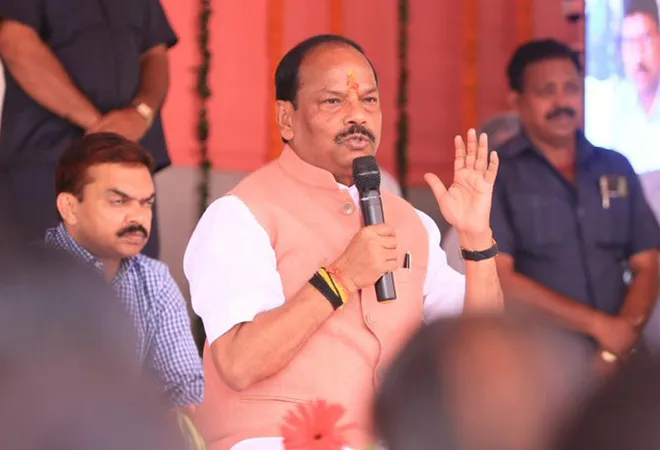-
CENTRES
Progammes & Centres
Location

In the recently announced five-phased assembly elections in the predominantly tribal state of Jharkhand, the ruling BJP is entering the electoral arena with an upper hand over a lack-lustre opposition.
Jharkhand elections are going to start from 30 November 2019 for its state assembly and results will be declared on 23 December 2019. This was announced by the Election Commission on 1 November. Voting dates for the five phases are 30 November, 7 December, 12 December, 16 December and 20 December as per the schedule announced by CEC Sunil Arora.
13 constituencies will vote in the first phase, 20 in the second phase, 17 in the third, 15 in the fourth phase and 16 constituencies will go to polls in the fifth phase. The assembly polls in the Maoist-affected state, which has a large tribal population, were held in five phases in 2014 as well.
The election will be the third state poll since Prime Minister Narendra Modi led the BJP to a massive win in Lok Sabha elections in April-May bettering his own electoral record made in 2014 parliamentary elections. It will also be the third BJP-ruled state to hold elections this year, following Maharashtra and Haryana, which voted on 21 October.
The BJP, which currently rules the state in an alliance with the All Jharkhand Students' Union (AJSU), will strive hard to improve results than what it recorded in Maharashtra and Haryana. The party was widely expected to win both states by comfortable margins but suffered setbacks, winning fewer seats in each than it did in the last election, although it did emerge as the single-largest party in both state.
In Jharkhand, the BJP government is led by Chief Minister Raghubar Das. The BJP rose to power after winning 37 seats in the 81member house in 2014. Its ally, the All Jharkhand Student Union (AJSU), won 5, taking the NDA past the majority mark. Later, six of the eight legislators of the Jharkhand Vikas Morcha (JVM) of former state chief minister Babulal Marandi had defected to the BJP making the ruling alliance comfortable in numbers. The BJP's dominant performance also saw it reduce the Congress to just six seats. The party also swept the state in Lok Sabha polls, winning 12 of 14 parliamentary seats.
The BJP has set a target of 65 this time. The state unit of the BJP and Chief Minister Raghubar Das, who has earned the distinction of being the only chief minister of the state to complete full five year term on the chair, are confident of achieving the target and are depending on Modi;s appeal and popularity along with the corruption free performance of the state government.
The BJP, learning its lessons from the recently held Maharashtra and Haryana assembly elections, is going to focus on local problems and their solutions instead of national issues like that of Article 370 or Triple Talaq or even Pakistan.
However, there are some problems that are confronting the ruling party and these are on account of the BJP’s allies like the AJSU and the Lok Janshakti Party (LJP) who are demanding bigger share of seats to contest. Allies, obviously, are feeling encouraged from political developments in Maharashtra where the BJP’s oldest ally Shiv Sena is hell bent to extract a higher price for remaining an ally. The AJSU is demanding more than 8 seats that it had contested in 2014 and the LJP that had failed to win any seat in the last elections is insisting on contesting six seats. The BJP is hopeful of sorting out these issues with its allies.
Another plus point for the ruling combine is the decision of the JVM headed by former chief minister and a tall tribal leader to go alone in the election thus splitting anti-incumbency votes. Similarly, the BJP has been successful in persuading the JD (U) led by Bihar Chief Minister Nitish Kumar to field candidates on Kurmi majority seats to stop Kurmi votes going to the opposition in general and to the Congress in particular.
On the other said, the opposition is still struggling to put its act together through the Congress and the JMM have announced a tie-up but they have yet to finalise the seat-sharing. "Everything is pre-decided, and the grand alliance will be announced soon," Jharkhand Congress chief Rameshwar Oraon told media Main goal was to oust the BJP, he asserted.
The JMM will be the majority partner and is likely to contest 44 seats. The Congress will get 27 and the rest will go to smaller allies, which include the Rashtriya Janata Dal (RJD) and Left parties, it said.
Whether the RJD and Left join the JMM-Congress alliance is under doubt and announcement by former state chief minister Babulal Marandi that he is not going to join the opposition alliance has given the BJP an edge since the opposition vote is going to be divided.
On surface, it appears to be an unequal battle but electorate’s mind is not easy to fathom and often enough proved beyond seasoned psephologists to decipher as under currents of discontent runs very deep.
The views expressed above belong to the author(s). ORF research and analyses now available on Telegram! Click here to access our curated content — blogs, longforms and interviews.

Satish Misra was Senior Fellow at ORF. He has been a journalist for many years. He has a PhD in International Affairs from Humboldt University ...
Read More +